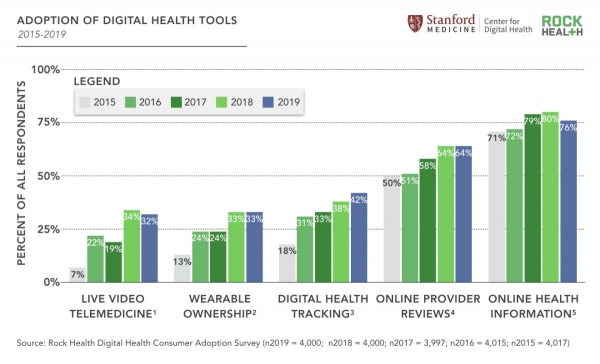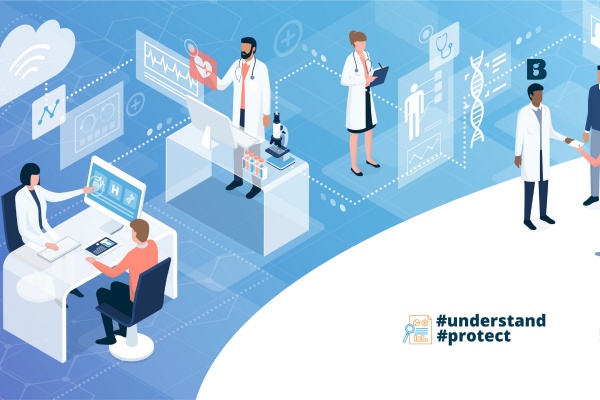Digital transformation is fueling revolutionary medical breakthroughs and facilitating an enhanced level of patient care. The transformation is forever changing how we conduct pertinent medical studies, build comprehensive patient care plans, and fight global pandemics, much like COVID-19.
Yet, it seems as though someone is always on the other side, ready to leverage innovation for their sinister agenda. Although we like to think the best of everyone, protecting patient and practitioner health data remains the top priority.
Healthcare Industry: A New Reality

At the onset of the novel coronavirus pandemic, healthcare providers had to make a sudden shift. A push for telemedicine, remote patient monitoring, and information-sharing steadily increased, while serious privacy concerns continued to match its growth.
The American Medical Association watched as a new wave of technology in the healthcare industry took hold. They issued new privacy principals that support the rights of individuals to control their personal health information.
Research suggests that patients are less willing to disclose information to physicians because they are afraid that data brokers and technology companies will use their ineffaceable health information. Patients communicating with physicians is incredibly pertinent in a world perturbed by COVID-19, and this glaring gap in patient trust is why the federal government is generating policy at multiple levels.
So, What’s the New Bill on Health Data?
Both parties in the United States Congress recognized the need to protect consumer health data. While the data has great potential to help fight the global pandemic, individuals need to be sure their information is safe from misuse.
In an attempt to quash data privacy concerns, both Democratic and Republican lawmakers introduced separate legislation that ensures proper usage and privacy protections.
The COVID-19 Consumer Data Protection Act
On May 7, 2020, Republican members of the Senate Commerce Committee introduced the COVID-19 Consumer Data Protection Act.
The Act would require companies under the jurisdiction of the Federal Trade Commission to obtain expressed affirmative consent from individuals to collect, process, or transfer their “personal health, device, geolocation, or proximity information to track the spread of COVID-19.
The Republican legislation would require companies to disclose to consumers how they handle, transfer, and retain their information. By enacting the law, consumers could choose to opt-out of information collection, while companies provide transparent reports to the public about their data collection activities.
The bill includes numerous other privacy protection measures; however, one-week later, Senate Democrats proposed a different bill.
The Public Health Emergency Privacy Act
On May 14, 2020, Democratic lawmakers introduced the Public Health Emergency Privacy Act. The bill would protect personal health data collected in connection with COVID-19 from being “used for non-public health purposes and provides for both public and private enforcement.”
The Act requires companies to obtain consent before collecting health information for COVID-19 tracking and enforces the transparency of the use of the data. Additionally, it would require companies to delete or de-identify data after the crisis passes.
The Democratic legislation forbids the use of emergency health data for discriminatory, unrelated, or intrusive purposes, which means it is prohibited to use health data for commercial advertising, e-commerce, or efforts to gain employment, finance, insurance, housing, or education opportunities.
Safeguarding Your Healthcare Data with Microsoft
Succeeding the lump sum of legal rhetoric, you may be thinking, “How exactly does this affect my organization and me?” Well frankly, the sudden digital transformation combined with new regulations from the American Medical Association and Congress pose complex challenges to those, much like you, who manage technological infrastructure in the healthcare industry.
Microsoft is no stranger to helping leaders in the healthcare industry overcome complex issues efficiently and effectively. The various tools that live within Microsoft’s Power Platform can help you harness information-sharing power while meeting the strict privacy protection regulations.
The Power Platform includes Power BI, Power Apps, Power Automate, and Power Virtual Agents. When you combine these four applications with Microsoft Azure, rest assured knowing you have a cutting-edge platform that will meet compliance requirements no matter what new privacy protection bills lawmakers enact.
If you are unsure where to start and how to navigate this uncharted territory, a Microsoft Partner, much like us, is ready to help.
Here is how we created a solution for a leading US Medical Records Management Company, streamlining manual business processes while saving millions and ensuring strict adherence to security and privacy requirements.





